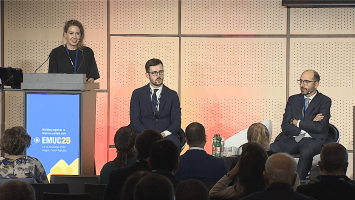Basically penile cancer is a rare disease. We have limited understanding of molecular mutations and the patients with relapsed disease have dismal outcomes. So basically the background of our study was to try and identify targetable mutations in penile cancer that could improve clinical outcomes and clinical trials.
We performed whole exome sequencing on 34 cases of penile cancer that had a clinical presentation that’s very similar to the clinical presentation of penile cancer in the real world. We performed whole exome sequencing and HPV PCR testing to identify HPV status. The two most important findings are that tumour mutational burden in penile cancer appears to be similar to lung and head and neck squamous cell carcinomas where immune checkpoint therapy has been approved so that could be an implication for a clinical trial where immune checkpoint could have an efficacy in this rare disease. On the other side from the Merkel alteration we noted that penile cancer seemed to have similar genomic mutations to other squamous cell carcinomas with one interesting finding that NOTCH1 mutations were mutated at a higher rate than others, we made it 35% of the cases in comparison to head and neck and the pan-squamous cell carcinomas where the usual mutation rate is around 11-15%. That coincided well with the recent finding from our collaborators from MD Anderson that were able to establish in vivo and in vitro data of the vulnerability of NOTCH1 loss of function mutation. That was the first study that shows vulnerability of the NOTCH1 loss of function mutation in head and neck cancers and that led to the biomarker driven clinical trial in head and neck cancer specifically for NOTCH1 loss of function mutation patients. We hope that if we see good early results to expand that study to include other squamous cell tumours with NOTCH1 mutation and that could be an opportunity for patients with relapsed penile cancer.








